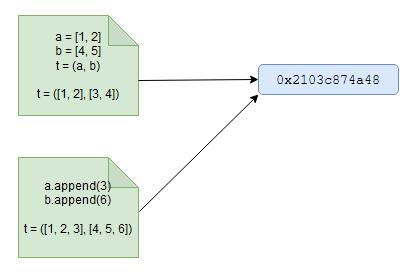Python, immutable objects and memory management, again →
In an earlier post, we saw how immutable objects like tuples are handled by Python’s memory management. It was straight-forward - tuples are immutable and so, when we try to update the tuple object, Python creates a new reference. Or does it? Always?
Let us consider the following tuple, this time a tuple of lists. Recall that lists in Python are mutable objects.
def mem_addr(item):
return hex(id(item))
a = [1, 2]
b = [4, 5]
t = (a, b)
print(t)
print('memory referenced by t: {0}'.format(mem_addr(t)))
And our output:
([1, 2], [4, 5])
memory referenced by t: 0x2103c874a48
We see that the memory referenced by the object t which in our case is a tuple is 0x2103c874a48. And we know that tuples are immutable objects in Python. So, let’s try to change the above tuple object t. This time we are going to do that by updating the individual elements a and b that constitute our tuple object.
a.append(3)
b.append(6)
print(t)
print('memory referenced by t: {0}'.format(mem_addr(t)))
And we get the following printed:
([1, 2, 3], [4, 5, 6])
memory referenced by t: 0x2103c874a48

And what just happened here? Our immutable object t got updated without a new reference being created. So, it is not just the object itself that matters, the type of the constituent objects also plays a role in memory management. Hope this is enough motivation to play around with different mutable and immutable objects and how Python’s memory management handles them.